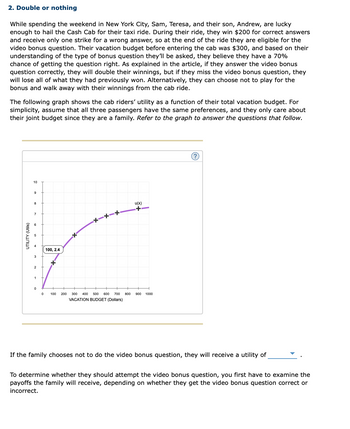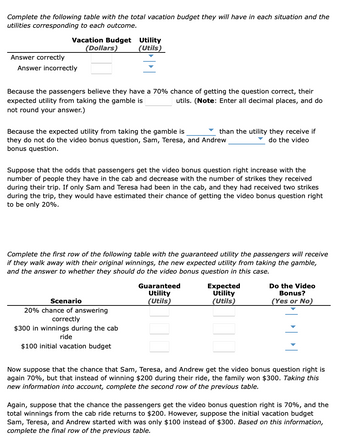
ENGR.ECONOMIC ANALYSIS
14th Edition
ISBN: 9780190931919
Author: NEWNAN
Publisher: Oxford University Press
expand_more
expand_more
format_list_bulleted
Question

Transcribed Image Text:2. Double or nothing
While spending the weekend in New York City, Sam, Teresa, and their son, Andrew, are lucky
enough to hail the Cash Cab for their taxi ride. During their ride, they win $200 for correct answers
and receive only one strike for a wrong answer, so at the end of the ride they are eligible for the
video bonus question. Their vacation budget before entering the cab was $300, and based on their
understanding of the type of bonus question they'll be asked, they believe they have a 70%
chance of getting the question right. As explained in the article, if they answer the video bonus
question correctly, they will double their winnings, but if they miss the video bonus question, they
will lose all of what they had previously won. Alternatively, they can choose not to play for the
bonus and walk away with their winnings from the cab ride.
The following graph shows the cab riders' utility as a function of their total vacation budget. For
simplicity, assume that all three passengers have the same preferences, and they only care about
their joint budget since they are a family. Refer to the graph to answer the questions that follow.
UTILITY (Utils)
10
9
8
7
5
4
3
2
1
0
0
100, 2.4
u(x)
+-
100 200 300 400 500 600 700 800 900 1000
VACATION BUDGET (Dollars)
(?
If the family chooses not to do the video bonus question, they will receive a utility of
To determine whether they should attempt the video bonus question, you first have to examine the
payoffs the family will receive, depending on whether they get the video bonus question correct or
incorrect.

Transcribed Image Text:Complete the following table with the total vacation budget they will have in each situation and the
utilities corresponding to each outcome.
Vacation Budget
(Dollars)
Answer correctly
Answer incorrectly
Utility
(Utils)
Because the passengers believe they have a 70% chance of getting the question correct, their
expected utility from taking the gamble is
utils. (Note: Enter all decimal places, and do
not round your answer.)
Because the expected utility from taking the gamble is
they do not do the video bonus question, Sam, Teresa, and Andrew
bonus question.
Suppose that the odds that passengers get the video bonus question right increase with the
number of people they have in the cab and decrease with the number of strikes they received
during their trip. If only Sam and Teresa had been in the cab, and they had received two strikes
during the trip, they would have estimated their chance of getting the video bonus question right
to be only 20%.
Scenario
20% chance of answering
correctly
$300 in winnings during the cab
ride
$100 initial vacation budget
than the utility they receive if
do the video
Complete the first row of the following table with the guaranteed utility the passengers will receive
if they walk away with their original winnings, the new expected utility from taking the gamble,
and the answer to whether they should do the video bonus question in this case.
Guaranteed
Utility
(Utils)
Expected
Utility
(Utils)
Do the Video
Bonus?
(Yes or No)
Now suppose that the chance that Sam, Teresa, and Andrew get the video bonus question right is
again 70%, but that instead of winning $200 during their ride, the family won $300. Taking this
new information into account, complete the second row of the previous table.
Again, suppose that the chance the passengers get the video bonus question right is 70%, and the
total winnings from the cab ride returns to $200. However, suppose the initial vacation budget
Sam, Teresa, and Andrew started with was only $100 instead of $300. Based on this information,
complete the final row of the previous table.
Expert Solution
arrow_forward
Step 1
DISCLAIMER “Since you have asked multiple questions, we will solve the first three questions for you. If you want any specific question to be solved, then please specify the question number or post only that question.”
Utility implies the comprehensive benefits of consuming a product or service. This sums up the utility definition. Consumers would typically focus on maximising their utility and relying on rational choice based on economic models.
Trending nowThis is a popular solution!
Step by stepSolved in 3 steps

Knowledge Booster
Learn more about
Need a deep-dive on the concept behind this application? Look no further. Learn more about this topic, economics and related others by exploring similar questions and additional content below.Similar questions
- You manufacture ceramic lawn ornaments. After several months your accountant tells you that your profit P(n) can be modeled by the function P(n)= -0.002n^2+5.2n-1208 where n is number of ornaments sold each month. A) How many ornaments must you make and sell to break even. B) How many ornaments must you make and sell to maximize profit. C) What is the maximum profit. D) How many ornaments must you make and sell in order to earn a profit of $1657.arrow_forwardI need the answer as soon as possiblearrow_forwardYou are the County Commissioner of Hazard County. Recently a severe wave of storms swept across Hazard County, spawning several tornadoes and creating a wide path of mayhem. The citizens of Hazard County are demanding that you do something to protect them. You decide to install some early warning tornado sirens. However, there is no money left in the county budget, so you ask each citizen to donate some money to build the system. Many citizens donate money to help build the warning system; however, Ms. Nancy, who is wealthy, decides she is not going to donate. The early warning sirens are an example of a and Ms. Nancy represents a Public goods are in rivalry and in excludability. What approach would be the least effective way to deal with free riders? OA. Appeal to their civic sense of responsibility. OB. Exclude citizens from benefiting from the good or service. OC. Threaten to expose the free riders to their neighbors. OD. Offer citizens a favor or a small gift if they agree not to…arrow_forward
- Thranduil company’s market research department is working on the pricing of a product. The field research shows that average demand is expected to be 8000 units at price 50 TL. From this point, each 1 TL change in price will negatively affect demand with a magnitude of 100 units. Fixed and variable costs are confronted for producing the product. According to the information obtained from the financial department, 200,000 TL is the estimate of fixed costs and 20 TL is the estimate of variable costs per unit produced. Assume that all units produced are sold.Which of the following prices is the one that maximizes the company's profit?arrow_forwardA studio manager stated that she would not turn down $2M per sequel right. If you paid $2M per sequel right, are you purchasing them for less than what they are valued?arrow_forward
arrow_back_ios
arrow_forward_ios
Recommended textbooks for you

 Principles of Economics (12th Edition)EconomicsISBN:9780134078779Author:Karl E. Case, Ray C. Fair, Sharon E. OsterPublisher:PEARSON
Principles of Economics (12th Edition)EconomicsISBN:9780134078779Author:Karl E. Case, Ray C. Fair, Sharon E. OsterPublisher:PEARSON Engineering Economy (17th Edition)EconomicsISBN:9780134870069Author:William G. Sullivan, Elin M. Wicks, C. Patrick KoellingPublisher:PEARSON
Engineering Economy (17th Edition)EconomicsISBN:9780134870069Author:William G. Sullivan, Elin M. Wicks, C. Patrick KoellingPublisher:PEARSON Principles of Economics (MindTap Course List)EconomicsISBN:9781305585126Author:N. Gregory MankiwPublisher:Cengage Learning
Principles of Economics (MindTap Course List)EconomicsISBN:9781305585126Author:N. Gregory MankiwPublisher:Cengage Learning Managerial Economics: A Problem Solving ApproachEconomicsISBN:9781337106665Author:Luke M. Froeb, Brian T. McCann, Michael R. Ward, Mike ShorPublisher:Cengage Learning
Managerial Economics: A Problem Solving ApproachEconomicsISBN:9781337106665Author:Luke M. Froeb, Brian T. McCann, Michael R. Ward, Mike ShorPublisher:Cengage Learning Managerial Economics & Business Strategy (Mcgraw-...EconomicsISBN:9781259290619Author:Michael Baye, Jeff PrincePublisher:McGraw-Hill Education
Managerial Economics & Business Strategy (Mcgraw-...EconomicsISBN:9781259290619Author:Michael Baye, Jeff PrincePublisher:McGraw-Hill Education


Principles of Economics (12th Edition)
Economics
ISBN:9780134078779
Author:Karl E. Case, Ray C. Fair, Sharon E. Oster
Publisher:PEARSON

Engineering Economy (17th Edition)
Economics
ISBN:9780134870069
Author:William G. Sullivan, Elin M. Wicks, C. Patrick Koelling
Publisher:PEARSON

Principles of Economics (MindTap Course List)
Economics
ISBN:9781305585126
Author:N. Gregory Mankiw
Publisher:Cengage Learning

Managerial Economics: A Problem Solving Approach
Economics
ISBN:9781337106665
Author:Luke M. Froeb, Brian T. McCann, Michael R. Ward, Mike Shor
Publisher:Cengage Learning

Managerial Economics & Business Strategy (Mcgraw-...
Economics
ISBN:9781259290619
Author:Michael Baye, Jeff Prince
Publisher:McGraw-Hill Education